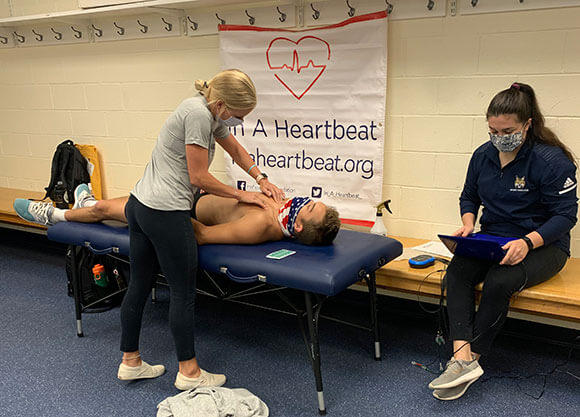
Saving lives, a ‘heartbeat’ at a time
October 04, 2021

October 04, 2021

He experienced cardiac arrest when he was just 17 due to previously diagnosed hypertrophic cardiomyopathy, and would have likely lost his life, if an EMT had not immediately administered CPR.
The EMT happened to be next door to where Papale was playing basketball, and helped him before medical personnel arrived. Once the ambulance did reach him, an automated external defibrillator (AED) restarted Papale’s heart.
So began a rocky road back to health for Papale, as he endured complications and dangerous surgeries throughout his 20s. In spite of — or perhaps as a result of — these challenges, Papale said he felt a need to share his experiences to raise awareness around hypertrophic cardiomyopathy and sudden cardiac arrest in the youth population.
This was how In a Heartbeat was born. The non-profit operates an AED donation program, as well as organizes early-detection events for children and their parents. It also raises money for research projects that focus on sudden cardiac arrest.
The heartbeat board includes Papale’s parents, Joan and Mike Jr., and his brother, John; along with Quinnipiac alumni and cardiac arrest survivor Chris Gatcomb ‘12, and Associate Athletic Director for Business and Administration at Quinnipiac Alyssa Hyatt.
Schools, businesses and non-profits are encouraged to apply for AED donations through In a Heartbeat’s website. The organization receives about 10 applications daily, and contributes to sites around the state and the world, said Papale.
AEDs save lives, and so does early detection of heart conditions.
In 2019, Papale and his team presented an electrocardiogram (ECG) program to Associate Professor of Medical Sciences Listy Thomas at Quinnipiac in the hopes of getting Quinnipiac medical students and others involved in this mission.
“We offer free cardiac screening electrocardiograms for children, teens and young adults. Medical students and athletic trainers conduct the tests, and the results are interpreted for families by doctors,” said Papale.
If anything unusual is detected, doctors recommend a follow-up exam with the family’s general practitioner.
Volunteer physicians include Dr. Felice Heller, a pediatric cardiologist at Connecticut Children's Medical Center, and Dr. Cheyenne Beach, a pediatric electrophysiologist with Yale New Haven Hospital. Heller was Papale’s doctor following his cardiac arrest.
Before testing events, volunteers are encouraged to attend a training session.
“Our volunteers are all at different parts of their medical careers. Some have more formal training, while others are still starting out,” said Papale.
Sara MacDonough-Civitello, athletic trainer for Quinnipiac’s men's basketball, often leads the exercises. In a Heartbeat provides necessary medical equipment for the events.
At the organization’s inaugural screening event at the Wallingford Park and Recreation Center this April, all testing volunteers were Quinnipiac students.
Many of these students offered their time again for the subsequent event, hosted in Wilton in May. At least two more screening events are planned for this year, said Papale.
Quinnipiac Today is your source for what's happening throughout #BobcatNation. Sign up for our weekly email newsletter to be among the first to know about news, events and members of our Bobcat family who are making a positive difference in our world.
Sign Up Now